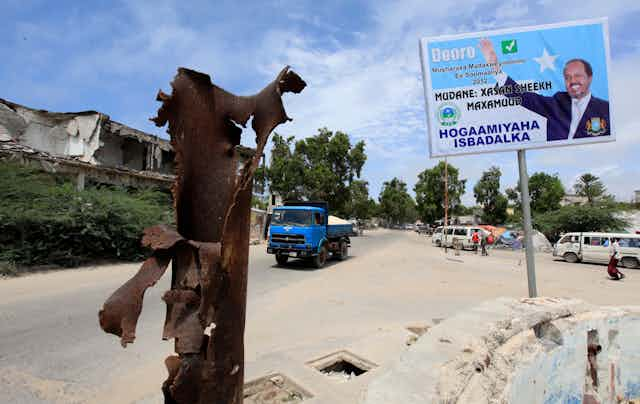Somalia is holding elections that are exciting, historic and complex.
The election of the 54 members of the Upper House of Parliament has kicked off in the capitals of the various federal states. The election of the 275 members of the Lower House of Parliament (House of the people) is scheduled to begin shortly. The final election will be when the two houses vote on who should be president. That is planned for the end of November.
The internationally-backed elections were scheduled to take place in August. But they were postponed because of logistical, financial and technical hitches. The government, for example, claims it didn’t have enough money to hold the elections. This was because the international community, supposedly, didn’t give Somalia the funding it had pledged.
These are the second elections in the country since 2012, the year a new constitution was adopted. This formed the first Federal Government for the federal state of Somalia, ending two decades of armed conflict.
The new parliament elected Hassan Sheikh Mohamud as president. This was the first election held in the country since 1991. As one of the intellectuals and a reformist interested in restoring peace and stability in Somalia, Hassan Sheikh represented a new lease on life for Somalia.
These elections promise to be as exciting. The line up of the aspiring presidential candidates includes the former regional President of Puntland and a woman. The failures and successes of the elections will also reveal the level of political maturity in Somalia and whether the election model it is using works.
Unique election process
Somalia has a unique and interesting election process. Conditions are not yet in place for a one-person, one-vote ballot. Therefore clan elders represent the people in electing members of parliament who then elect the President. The 2012 constitution stipulates that by 2020 the people will vote for office bearers.
In 2016, a total of 14,025 members of the electorate will choose the 275 members of parliament by secret ballot. 135 traditional elders are responsible for selecting these electoral delegates from their communities.
The notable differences from the 2012 elections include:
Then, only 135 traditional elders elected the members of the parliament. This year over a hundred times more Somalis will participate in the process.
The members of two houses of parliament will be selected through the electoral processes. In 2012 a parliament consisting of a single house was elected.
The parliamentary voting four years ago took place exclusively in Mogadishu. This year voting will occur in at least six cities nationwide.
The Federal Indirect Electoral Implementation Team is responsible for the oversight, overall planning of the electoral process and for ensuring its uniformity across all states. Some of the greatest challenges it faces will be in ensuring the election’s transparency, dealing with clan and regional politics as well as financial and security challenges.
Clan politics
A major dilemma for the electoral team is to deal with the idea of “several governments within a government”. This is because the federal states all operate independently of each other. Also, the nomadic model of hierarchical leadership – with a clan elder as a leader – adds the dimension of clan and sub-clan power politics.
The idea of involving the elders is to promote a sense of power sharing among the contesting clans. But this process intensifies nepotism and clan loyalty or patronage.
There are fears that traditional elders or federal presidents might influence the election outcomes using their power or authority. There’s also concern that the lack of accountability and transparency in the nomination of traditional elders promotes corruption. In fact, there are already reports that some presidential candidates are bribing their way to election.
Cash-strapped and insecure
Another fundamental issue is that Somalia is not financially independent. It derives its funds from the international community or donors.
In the case of these elections, international actors – such as the US and the European Union – have pledged to provide approximately 60% of the required budget. But, even with support, the financial burden on the federal reserve is huge. Particularly considering the security the country will have to provide to the electoral team throughout the duration of the process.
The main security challenge is the upsurge of bombing by the Somali militant group, Al-Shabaab.
During the election period, it is feared that attacks and assassinations by Al-Shabaab will increase. This is because they will try to manipulate and threaten the traditional elders. They will also be taking advantage of the fact that the government will be focused mainly on the election.
Despite the complications and challenges of the electoral process in Somalia, it promises to be a game changer. Internally, new people and their ideas will be at the helm. Externally, it might be a demonstration that the country is finally coming into normalcy after many years of instability.

